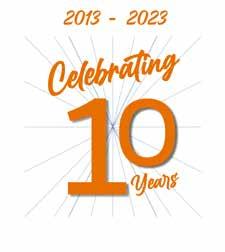
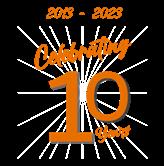
JULY 2022 TO JUNE 2023




JULY 2022 TO JUNE 2023

The University of Florida Transportation Institute (UFTI) is an umbrella organization housing several transportationrelated centers within the University of Florida.
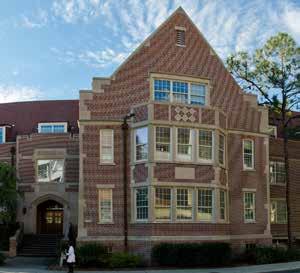
Vision Statement
To conduct and foster impactful, cross-cutting, multimodal transportation research; educate the next generation of transportation leaders and facilitate technology transfer.
Mission Statement
To lead the profession in shaping a better transportation future by functioning as a pre-eminent center of multidisciplinary transportation research, students’ top choice for transportation education, and a provider of state-of-theart analysis and decision support tools.
Dear Colleagues,
As you have probably heard by now, this is my last academic year as UFTI director. I will be stepping down from this position in June 2024 and plan to continue participating in research and educational activities. I firmly believe that change and renewal are necessary for all organizations. Therefore, it is time for new leadership to bring a new perspective and ideas and help the UFTI grow stronger with an expanded research and education portfolio. I plan to continue to work as a faculty member in research projects and will do everything I can to assist the new UFTI director and facilitate a seamless transition.
Since I joined UF in 2004, I have worked to coalesce the transportation-related activities of the university under one umbrella, seeking to establish close ties between various groups and centers working on transportation topics across several colleges and departments. Those efforts led to the creation of the UFTI, which is celebrating its tenth year. The UFTI now has approximately 140 faculty affiliates across five colleges and 42 staff housed in the Herbert Wertheim College of Engineering. Our annual research expenditures have been steadily increasing and reached more than $14M this year.
With UFTI Associate Director Dr. Siva Srinivasan's assistance and FDOT's support and feedback, the UFTI has developed a new master's degree for transportation professionals, which is available online and has already attracted more than 50 students over the past two years.
I am very thankful to the UFTI leadership team, staff, affiliated faculty, and students for their significant contributions and tireless efforts to engage in our research groups and educational activities, participate in our events, and expand the Institute's reach. I am also very thankful to all the UFTI External Advisory Board (EAB) members, who have selflessly provided guidance, advice, networking opportunities, and career advice to our students. My heartfelt thanks to the UFTI Inaugural EAB Chair, Milton Carrasco, and Immediate Past EAB Chair Tom Byron. I am also very thankful to our recently appointed EAB chair Ananth Prasad, for agreeing to serve in this capacity, I am certain he will provide excellent leadership during this time of transition.
My thanks also go to the US DOT, FDOT, City of Gainesville, and all our sponsors and collaborators who have contributed in many ways to the UFTI's success over the past ten years. This annual report highlights some of our
products and projects funded by these agencies and spotlights our research funded by the National Cooperative Highway Research Program (NCHRP) of the National Academies.
I hope our paths cross again during the next phase of my career.
Sincerely,

2023
2,343
Participants in Continuing Education Courses
56
Graduate Students (Civil Engineering)
138 + 33
185 Courses Offered (T2 & McTrans)
Faculty Affiliates & Staff
The Florida Department of Transportation (FDOT), the City of Gainesville (CoG) and the UFTI have partnered to create the Implementing Solutions from Transportation Research and Evaluating Emerging Technologies (I-STREET™) Living Lab on the UF campus and surrounding highway network. I-STREET™ develops, deploys and evaluates numerous advanced technologies including connected and autonomous vehicles, smart devices and sensors. lt also develops and applies novel applications to enhance mobility and safety.
The McTrans Center develops, distributes, and supports cost-effective and widely accessible traffic analysis tools for traffic engineering and transportation planning applications. Known for its signature Highway Capacity Software (HCS), the Center also supports other notable applications: Highway Safety Software (HSS,) TSIS-CORSIM and TRANSYT-7F. Over three decades of operation, the McTrans Center has established itself as a cornerstone in this domain, aiding thousands of professionals and significantly contributing to the advancement of traffic engineering and transportation planning practices.
As an umbrella organization for many national and state-based programs, the T2 Center provides training, technical assistance, technology transfer services and safety information to transportation, public works and safety professionals, as well as the general public. T2's mission is to transform engineering research and technology into common practice and to foster a safe, efficient, environmentally sound transportation system by improving skills and knowledge.
Contact:
Pruthvi Manjunatha, Ph.D.
I-STREET ™ Manager & Research Assistant Professor
pruthvim@ufl.edu / istreet.ce.ufl.edu
Contact: Ines Aviles-Spadoni, M.S.
iaviles@ce.ufl.edu
stride.ce.ufl.edu
Contact:
Bob Aghdashi, Ph.D.
McTrans Director
saghdashi@ufl.edu / mctrans.ce.ufl.edu
Contact:
Nithin Agarwal, Ph.D.
T2 Director
nithin.agarwal@ufl.edu / techtransfer.ce.ufl.edu
The STRIDE Center is the 2016 USDOT Region 4 (Southeast) University Transportation Center (UTC) housed at the University of Florida Transportation Institute (UFTI.) STRIDE’s mission is to develop novel strategies for reducing congestion. The Center has nine partners, representing seven states in the Southeastern U.S.
Background:
State departments of transportation (DOTs) and transportation agencies are charged with avoiding discrimination in the application of federal funding to plan, design, build and operate transportation through a variety of laws, executive orders and regulations.
As they seek to deliver quality projects that improve transportation infrastructure and services within their service jurisdictions, agencies remain challenged to create meaningful public engagement in transportation decision-making processes, particularly with underserved and vulnerable communities such as low-income, minority and limited English proficiency individuals and communities.
Goal:
The research results will introduce a manual that includes:
NCHRP 08-161
1) Practical strategies, processes, methods, and/ or procedures for cultivating meaningful public engagement in transportation decision-making,
2) A robust implementation plan that articulates a strategy for marketing and bringing resources to the state DOT community
3) A framework to create engagement plans that inclusively invite vulnerable communities to the table of decision-making and promote peopleoriented issues such as cultural and social values.
Status: Active
Research Team: Bob Dean (PI)
Chief Strategy and Program Officer Center of Neighborhood Technology Mehri Mohebbi, Ph.D.
University of Florida Transportation Institute
NCHRP 15-66
Background:
The Highway Capacity Manual (HCM) does not currently provide methods for evaluating arterial weaving segments. There have been very few previous studies to evaluate such segments, and no previous studies have evaluated their safety.
Goal:
The primary objective of this project was to develop a deterministic method for evaluating the operational performance of weaving sections on arterials.
The secondary objective was to identify the safety effects of varying geometric, volume, and traffic conditions in weaving sections on arterials.
Status: Completed
Research Team:
Lily Elefteriadou, Ph.D. (PI), Gustavo Zschaber, Ehsan Amini, Ph.D., Bob Aghdashi, Ph.D., Orestis Karamouzis and Alain Carrer
University of Florida Transportation Institute
Christopher Kinzel and Irfan Ahmed HDR Engineering, Inc.
Darren Torbic, Ph.D.
Texas A&M Transportation Institute
Alexandra Kondyli, Ph.D.
University of Kansas
Background:
Rural highways account for a very significant portion of the national highway system and serve many vital mobility purposes such as:
- Connectivity between major urban areas
- Access to rural recreational areas
- Access to special events held in rural areas
- Evacuation route for extreme events
- Diversion of traffic from another disrupted route.
Goal:
The objective of this research was to:
1) develop reliability and level of service analysis methodologies for rural highway facilities, consistent with existing HCM methods and
2) develop a guidebook on the application of the analysis methodologies.
NCHRP 08-135
Status: Completed
Research Team:
Scott S. Washburn, Ph.D. (PI)
University of Florida, Gainesville, Florida
Ahmed Al-Kaisy, Ph.D. and Sajid Raza
Montana State University, Bozeman, Montana
Ana Moreno, Ph.D.
Technical University of Munich Munich, Germany
Bastian Schroder, Ph.D. and Jorge Barrios Kittelson and Associates, Inc.
Wilmington, North Carolina and Orlando, Florida
Product: Criteria for Deploying Service Patrol Vehicles that Consider Passenger Vehicle and Truck Volumes, TOD, Day of Week and Seasonal Needs
What do they do? The products detect secondary incidents on freeways by using incident location and time data from archived database(s). Transportation planners and engineers can improve congestion management by using the algorithms to prioritize locations that are prone to secondary incidents for service patrol deployment.
Research Team:
Chris Cunningham, PE; Thomas Chase, PE ,and Ishtiak Ahmed, Ph.D., PE, University of North Carolina/ITRE
Angshuman Guin, Ph.D., Georgia Institute of Technology
Rod E. Turochy, Ph.D., Auburn University
Andrew J. Sullivan, Ph.D., University of Alabama at Birmingham
Product: Continuing Education Courses (Autonomous and Connected Vehicles: Introduction to the Health Care Professional of Older Adults’ Perception of Automated Vehicle Technology)
Research Team:
Sherrilene Classen, Ph.D.; Justin Mason, Ph.D.;Nicole E. Stetten, Ph.D.; University of Florida
Seung-Woo Hwangbo, OTD and Joseph Kwan, B.S. University of Florida
Virginia Sisiopiku, Ph.D. and Wencui Yang, Ph.D., University of Alabama at Birmingham
Brandy McKinney, MBA, University of Alabama at Birmingham
Product: Decision-Support Tool for Stakeholders (SERMOS)
What does it do? Allows users to click any location on the map to report an e-scooter incident or leave a comment. The tool includes an equity monitor, parking violation detector, and trip pattern analysis. SERMOS is a tool that collects and analyzes e-scooter-related data.
Research Team:
Xilei Zhao, Ph.D. and Ruth Steiner, Ph.D., University of Florida
Virginia Sisiopiku, Ph.D., University of Alabama at Birmingham
Product: Practitioner Survey, Practitioner Interview Methodology, & Recommendations
What does it do? Informs about practitioner experience of workforce development issues in the Southeast. It establishes a baseline understanding of the region's workforce development environment through focused interviews and potential strategies that policymakers and researchers can use to develop, coordinate, and implement workforce development programs in the Southeast.
Research Team:
Ruth Steiner, Ph.D., University of Florida
Mohammed Hadi, Ph.D., Florida International University
James Martin, PE, North Carolina State University
Virginia Sisiopiku, Ph.D., University of Alabama at Birmingham
Dimitra Michalaka, Ph.D., The Citadel
Steven Click, Ph.D., Tennessee Technological University
Product: Motorist Survey
What does it do? Asks motorists to list the information sources they used to select detour routes during construction. State and local transportation agencies can use information from the survey to plan detour routes for major construction projects.
Research Team:
Andrew Sullivan, Ph.D. and Virginia Sisiopiku, Ph.D. University of Alabama at Birmingham
MD Saiful A. Khan, MSCE and Afrin Anni, MSCE, University of Alabama at Birmingham
Paul Gilliam, MSE, P.E., Sain Associates, Inc.
Product: Emission Estimating Models for Replacing Diesel Buses with Electric Buses
What does it do? Informs transit agencies how transitioning to an electric bus fleet can help achieve the USDOT’s decarbonization goals.
Research Team:
Xilei Zhao, Ph.D., Xiang ‘Jacob’ Yan, Ph.D., University of Florida
Virginia Sisiopiku, Ph.D., University of Alabama at Birmingham
Nikhil Kaza, Ph.D., University of North Carolina at Chapel Hill
Xia Jin, Ph.D., Florida International University
Jeffrey LaMondia, Ph.D., Auburn University
Andrea Broaddus, Ph.D., Ford Motor Company

The STRIDE Center is the 2016 U.S. Department of Transportation (USDOT) Regional (Southeast) University Transportation Center (UTC) housed at the University of Florida Transportation Institute.
Project E5 - A Framework to Promote Diversity & Inclusion in Workforce Development in
Product : Training Webinar on How to Build Diversity & Enhance Inclusion within the Transportation Workforce
What does it do? Introduces tools and techniques to support diverse groups of employees within the transportation workforce to provide guidance for the public and private sectors on dealing with the needs of communities in the aftermath of a crisis.
Research Team:
Mehri M. Mohebbi, Ph.D., University of Florida
Virginia Sisiopiku, Ph.D., University of Alabama at Birmingham
Dimitra Michalaka, Ph.D. and Kweku Brown, Ph.D., The Citadel
Project H3 – Smartphone-Based Incentive Framework for Dynamic Network-Level Traffic Congestion Management
Product : Correlated Equilibrium Routing Mechanism
What does it do? Makes recommendations for routes that optimize traffic conditions are beneficial to the driver. This tool can help reduce traffic congestion and reduce costs by providing efficient route guidance.
Research Team:
Lili Du, Ph.D., University of Florida and Srinivas Peeta, Ph.D., Georgia Institute of Technology
Project K3 - Traffic Congestion Identification & Prediction Based on Image Processing & Deep Learning Methods
Product : Short-Term Traffic Flow Prediction Methodology
What does it do? Forecasts short-term traffic flow of a single sensor and was found to be accurate and efficient in predicting congestion at key locations. The methodology is a hybrid that uses data decomposition and deep learning. Benefits include smarter choices for travelers to avoid congested roads. Transportation agencies and navigation companies can use the methodology to ease traffic congestion.
Research Team:
Robert Whalin, Ph.D. and Guojing Hu, Ph.D., Jackson State University
Project K5 - A Better Understanding of Shopping Travel in the US
Product: A Shopping Travel Methodology
What does it do? Estimates the amount of travel in the US that supports shopping activities providing information about how much people travel for shopping. This information can be used in transportation forecasting and modeling.
Research Team:
Matthew Wigginton Bhagat-Conway, Ph.D., University of North Carolina at Chapel Hill
Zuri Garcia, Student, University of North Carolina at Chapel Hill
Deborah Salon, Ph.D., Arizona State University
What does it do? Integrates multiple data sources from signalized intersection corridors, which provides transportation agencies with more accurate performance metrics to manage traffic flow better, reduce congestion, and reduce accidents caused by stop-and-go traffic and other congestion-related incidents.
Research Team:
Shoaib Samandar, Ph.D. and Nagui Rouphail, Ph.D., North Carolina State University/ITRE
Gyounghoon Chun, Doctoral Candidate, North Carolina State University/ITRE
Thomas Chase, M.S., University of Florida
Product : Curbside Educational Course Module
What does it do? An educational tool developed for transportation engineering students that introduces them to users and potential users of a curb zone, examines curb treatments, including the use of technological solutions, and the process that engineers and planners use to make informed curb decisions.
Research Team:
Kari Watkins, Ph.D., University of California, Davis (formerly at Georgia Institute of Technology)
Michael Hunter, Ph.D., Georgia Institute of Technology
Rebecca Kiriazes, Ph.D., The Catholic University of America (formerly a doctoral student at the Georgia Institute of Technology)
Matteo Saracco, M.S., Georgia Institute of Technology

In Summer 2023, the Florida legislature recognized the University of Florida Transportation Institute's (UFTI) I-STREET™ program with the passage of Senate Bill 64 and House Bill 425 –emphasizing collaboration with other universities in Florida and transportation companies around the world.
I-STREET™ (Implementing Solutions from Transportation Research and Evaluation of Emerging Technologies) has been in existence since 2017, conducting research sponsored by local, state and national agencies, and collaborating with several universities and companies to develop state-ofthe-art traffic management systems that enhance safety and mobility.
According to the new legislation, I-STREET™ will continue to be a resource for the Legislature, FDOT, local governments, and national metropolitan regions, as well as the private sector in transportation. I-STREET™ is tasked with providing the state with a comprehensive annual report that outlines its goals, efforts, and progress.
Furthermore, the legislature created the I-STREET™ advisory board, which will meet periodically to review its research program and will consist of nine members with expertise in transportationrelated areas. In addition to including four members nominated by the University of Florida’s College of Engineering and approved by the University’s president, it will include a member appointed by the President of the Senate, a member appointed by the Speaker of the House of 279 Representatives, the Secretary of Transportation or his or her designee, the Secretary of Economic Opportunity or his or her designee and a member of the Florida Transportation Commission.The UF College of Engineering’s nominees will include representatives of the University of Florida, other academic and research institutions and private entities.
Emerging transportation technology companies who partner with I-STREET™ have access to Connected Autonomous Vehicle (CAV) and technology data and may work with I-STREET™ to test the functionality and effectiveness of their transportation safety and mobility solutions. Research projects conducted by I-STREET™ produce and evaluate tools targeting wide-scale implementation. I-STREET™ staff work closely with UF Innovate to support startups and productize innovations.


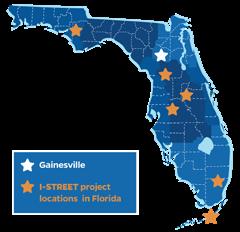
By joining UFTI’s Industry Partnership Program (IPP), your company’s contribution supports the work we do in Florida and beyond. Funds raised through partner contributions are used to support student scholarships and fellowships, independent research, technology development and innovation in transportation.
Collaborate on IP
Recruit and place world-class UF students
Access to UF facilities through research collaboration
Enhance your visibility as a partner and supporter
Join us in special webinars, events, and talks
Partner on proposals for national, state, and locally funded projects:
- HiPerGator AI Supercomputer
- I-STREET™ Living Lab
CONTACT
Nicholas Cole Director of Development
Herbert Wertheim College of Engineering n.cole@eng.ufl.edu
Pruthvi Manjunatha, Ph.D.
I-STREET™ Manager Research Assistant Professor pruthvim@ufl.edu
Master’s Degree in Civil Engineering with a Concentration in Transportation Leadership
The “Transportation Leadership” concentration is a new initiative targeted at working professionals who are looking for career advancement to leadership roles in the transportation profession. This on-line degree offers a blend of technical and leadership courses and is offered in collaboration with the Engineering Leadership and Engineering Innovation Institutes at UF. This program is open to students who have a bachelor’s degree (not limited to civil engineering) and work experience in a transportation-related field. Upon admission to the program, students will first take the core course “Fundamentals of the Transportation Profession” which is focused on the past, present, and future of the profession.
Guest speakers will address various themes such as institutions, public policy, financing, economics, public engagement, communications, leadership, management and select technical issues. The students will take three additional core classes: Engineering Leadership, Fundamentals of Engineering Project Management and Engineering Innovation. The students can take the remaining six courses from a wide array of on-line transportation-related courses offered by the UFTI. There are also opportunities for transferring-in relevant graduate credits from other institutions. Professionals working for the state of Florida may be eligible for tuition waiver. Students can start this program in both Spring and Fall semesters.
The Transportation Operations and Planning (TOP) Certificate Program has been established for transportation professionals with interests in transportation systems management, operations, and transportation planning. This is a UF certificate based on three graduate courses and taught by faculty in the Department of Civil and Coastal Engineering who are affiliated with the UF Transportation Institute. The program is administered through the Department of Civil and Coastal Engineering (CCE) Department which is housed in the Engineering School of Sustainable Infrastructure and Environment (ESSIE.)
For more information, contact: Dr. Siva Srinivasan, siva@ce.ufl.edu
In 2023, T2’s Training Program hosted 166 webinars, self-guided, and in-person courses, enrolling 1,792 students from over 500 national and international entities in subjects such as work zone safety, transportation equity, signal operations, ethics, and engineering fundamentals.
T2 partnered with the International Society of City and Regional Planners and the Institute of Transportation Engineers to provide member discounts. T2’s active roles on technical committees with the Transportation Research Board, National Committee on Uniform Traffic Control Devices, and the American Public Works Association allows T2 to bring the latest technology and practice to trainees.
 Nithin Agarwal, Ph.D. Director
Nithin Agarwal, Ph.D. Director
Since 2010, the T2 Center has operated the Safety Resource Centers (SRCs) for PedBike and Occupant Protection for the FDOT Safety Office. Last year, these centers distributed 126,000 safety materials, 1,050 car seats, 181 $2-Difference car seats and 39,718 bicycle helmets to community safety partners throughout Florida.
The SRCs also supported Florida’s child passenger safety technicians and instructors through 311 scholarships to certify new technicians and 15 instructor stipends. Over 350 new bicycle helmet fitting certifications were issued. T2 is working with the Safety Office to centralize ordering and distributing safety materials and equipment for all 17 FDOT safety emphasis areas to help fulfill FDOT’s “Target Zero”: zero fatalities and injuries resulting from traffic crashes in Florida.

To help more schools and communities start SRTS programs, T2 is working with the FDOT Safety Office and Florida’s Safe Routes to School (SRTS) Program to develop online training and a master plan to guide SRTS’s growth.
T2’s Transportation Safety Center assisted over ten local agencies in developing safety plans using novel methods to identify crash hotspots and provide local agencies with options to reduce crashes. T2 worked with its sister center, McTrans, to promote its Highway Safety Software. McTrans is a major supplier of traffic engineering software worldwide.
T2 also provided training expertise to a very successful workforce development symposium sponsored by the UFTI’s (STRIDE) Center, a federally funded University Transportation Center (UTC.)

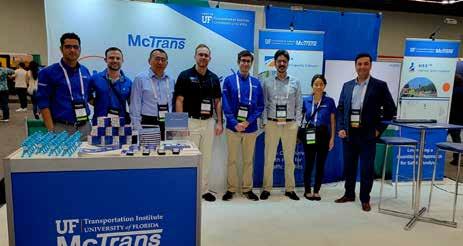
McTrans increased its revenue by 24% compared to the previous year. This was through the hard work of staff, faculty ,and students producing highquality software and services for users. Following the publication of the 7th Edition of the Highway Capacity Manual (HCM) by the Transportation Research Board (TRB) in 2022, McTrans released “Version 8” of Highway Capacity Software (HCS2023.)
The HCS2023, as part of the Version 8 series, complies with the newly released HCM and is offered as Software as a Service (SaaS.) With this move, McTrans joined the pioneer tier in the industry in moving away from the old perpetual model and enabling everyone to afford to access traffic analysis software.



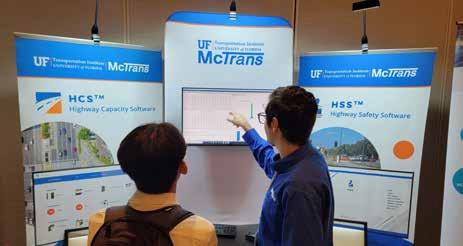
Besides HCS, McTrans released a major update for TSIS-CORSIM software in the past year. The TSIS-CORSIM2023 software integrates live Bing map (offered by Microsoft) and newly developed D3 charts and graphics to the CORSIM, the transparent backend initially developed by the Federal Highway Administration (FHWA). Similar to HCS, TSIS-CORSIM is offered as SaaS, making it an affordable option for transportation professionals.
Besides software development, dissemination, and support, McTrans set a new record in training the professional community on topics related to the Highway Capacity and Safety Manuals. Through the partnership with the Institute for Transportation Engineers (ITE), McTrans was able to extend its reach and offer more training sessions.
 Bob Aghdashi, Ph.D. Director
Bob Aghdashi, Ph.D. Director
This past year, UFTI students participated in several activities that made clear that their education and skills are top-notch. As members of UF Institute of Transportation Engineers Student Chapter (GatorITE) they once again promoted their research, education, leadership and professional ethics, and were led by Chapter President, Bryce Grame and Chapter Advisor, Fabio Sasahara, Ph.D.
One milestone was the founding of a new student organization: Institute of Electrical and Electronics Engineers-Intelligent Transportation Systems Society (IEEE-ITSS) which focuses on electrical and computer technology applications in transportation. The Chapter President is .Kim Chadalawada and the Chapter Advisor is Pruthvi Manjunatha, Ph.D.
They also developed a seminar series titled Female Leaders in Transportation, a series of 10 presentations where female leaders in the transportation industry and academia shared their experiences in the field, and significantly increased their social media presence on LinkedIn and Instagram.
Students collaborated with the Gainesville Regional Transit System on a study that is
working to leverage eye-tracking technology to improve safety for vulnerable road users. In partnership with McTrans, the student chapter organized and provided an on-line, multi-institution TSIS-CORSIM educational session. This session provided technical experience with new microsimulation software, providing professionals an opportunity to practice training sessions with students before developing industry training sessions. This experience gave students priority access to knowledge that will make them valuable entry-level analysts.
GatorITE students also published or presented more than 20 papers at international conferences and in journals this past year, demonstrating their diverse research portfolio.
Florida Puerto Rico District ITE: In October 2022, UFTI’s students placed 1st and 2nd at the 2022 ITE FLPR annual meeting’s Shark Tank competition, held in Saint Augustine, Fla.
The Florida Automated Vehicle Summit: The FAV Summit was held in Fernandina Beach in December 2022. The annual summit assembles industry leaders from around the world
to address technologies, operations and policy issues and is an opportunity for UFTI students to present their findings. Several students presented posters related to the study of automated, connected, electric and shared (ACES) mobility, operations, law, infrastructure, functional design, cyber security, ethics, aftermarket products, enabling technologies and public policy.
Leonida Kibet received the 1st place award at the FAV Summit Poster competition for her poster titled, “State-of-the-Art in Vehicle-To-Pedestrian (V2P) Systems Technology Survey and Recommendations for Effective Deployments.”
Transportation Research Board: A cohort of several students traveled to Washington D.C. to attend the 102nd TRB meeting in January 2023 and Graduate Research Assistant, Bryce Grame, received an achievement award and


grant from the Dwight David Eisenhower Transportation Fellowship Program, part of the U.S. Department of Transportation Federal Highway Administration (USDOT FHWA.)
Plugfest: In June 2023, students attended OmniAir’s Plugfest. It was held at SunTrax near the FDOT closed course facility for testing advanced transportation technologies. Agustin Guerra, Ph.D. and Luan Carvalho, Ph.D., and doctoral students Renan Favero, Victoria Zorbas and Orestis Karamouzis participated in the event. The UF team showcased the real-time
Siddartha Gulhare, Ph.D.
Sagar Patni, Ph.D.
Spring
Agustin Guerra, Ph.D.
Da Kuang, M.S.
Yanjun Shi, M.S.
Luan G. S. Carvalho, Ph.D.
Yiming Xu, Ph.D.
Hanyu Zhang, Ph.D.
Ryan Kenis, M.E.
Jiahua Qui, Ph.D.
Anran Zheng, M.S.
intersection optimizer (RIO) algorithm demonstration for attendees. When they weren’t studying, testing, networking or competing, the group took several field trips around Florida where they learned more about autonomous vehicles, visited the Tampa Hillsborough Expressway Authority (THEA) and the University of South Florida’s Connected & Autonomous Transportation Systems Laboratory (USF CATS Lab) in Tampa. The GatorITE chapter is made up of 20% undergraduate and 80% graduate students and has undertaken several new member recruitment efforts, including Traffic Bowl outreach in transportation classes.
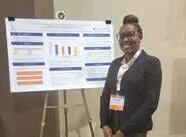
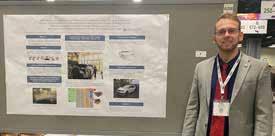

















Nithin Agarwal, Ph.D. Director UFTI-T2 Center

Bob Aghdashi, Ph.D. Director McTrans Center

Mehri Mohebbi, Ph.D. Transportation Equity Program Director, Department of Civil & Coastal Engineering

Jennifer Bridges, Ph.D. Associate Professor
Department of Civil & Coastal Engineering


Sanjay Ranka, Ph.D.
Department of Computer & Information Science & Engineering
Department of Civil & Coastal Engineering


Lili Du, Ph.D. Associate Professor
Department of Civil & Coastal Engineering

Lily Elefteriadou, Ph.D. Director, UFTI & STRIDE Barbara Goldsby Professor, Department of Civil & Coastal Engineering

Ruth Steiner, Ph.D. Professor
Department of Urban & Regional Planning


Eakta Jain, Ph.D. Associate Professor
Department of Computer & Information Science & Engineering
Pruthvi Manjunatha, Ph.D. I-Street™ “Living Lab” Manager & Research Assistant Professor
Department of Civil & Coastal Engineering


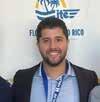
Yu Wang, Ph.D. Assistant Professor
Department of Mechanical & Aerospace Engineering
Xiang "Jacob" Yan, Ph.D. Assistant Professor
Department of Civil & Coastal Engineering




Department of Civil & Coastal Engineering
Ines Aviles-Spadoni, M.S. Research Coordinator STRIDE Center Ada Lang Communications Specialist Jennifer Gomez Administrative Assistant Ondine Wells, M.S. Education & Technology Transfer Coordinator STRIDE Center Dona Moss Grants Administrator Professor Gustavo Zschaber Ph.D. Student Transportation Student Body Representative Siva Srinivasan, Ph.D. Professor UFTI Associate DirectorAlobeidyeen, A., Yang, H., & Lili Du (2022). Information dissemination dynamics through vehicleto-vehicle communication built upon traffic flow dynamics over roadway networks. Vehicular Communications, 41, 100598.
Andrade, G., Aghdashi, B., Sasahara, F., & Sampson, W. (2022). Highway Capacity Manual Reference Guide. U.S. Department of Transportation / Federal Highway Administration FHWA-HOP-14-037, 1-90. (November 2022)
Bejleri, I., Srinivasan, S., Xu, X. & Rodrigues Silva, K. (2022). Characterizing curve crashes in Florida: Final Report. Report BDV31-977-135 submitted to Florida Department of Transportation, State Safety Office.
Classen, S. (2022). Develop, Refine and Validate a Survey to Assess Adult’s Perspectives of Autonomous Ride-Sharing Services. Report: Florida Department of Transportation. Project number BDV31-977-128. United States Department of Transportation Collection, National Transportation Library, Washington DC.
Classen, S., Li, Y., Giang, W., Winter, S.M., Wei, R., Patel, B., Jeghers, M. Gibson, B., Rogers, J., & Ramirez, A. (2022). RCT Protocol for driving performance in people with Parkinson's using autonomous in-vehicle technologies. Contemporary Clinical Trials Communications. 28, 100954, 1-7. https://doi.org/10.1016/j.conctc.2022.100954 IF=2.226.
Chen, R., Tran, K.T., Dinh, K., & Ferraro, C. (2022). Evaluation of ultrasonic SH-waveform tomography for determining rebar location and size in concrete structures. Journal of Nondestructive Evaluation, Vol. 41 (35), https://doi.org/10.1007/s10921-022-00866-1, (Impact Factor: 2.484).
Deng, Y. & Kaber, D.B. (in press). Advanced Driver Assistance Systems: Transparency and Driver Performance Effects. In G. Fortino, D. B. Kaber, A. Nürnberger & D. Mendonca (Eds.), Handbook of Human-Machine Systems (1st edn.). Piscataway, NJ: IEEE Press/Wiley.
Fang, J., Yan, X., Bejleri, I., & Chen, C. (2022). Which trip destination matters? Estimating theinfluence of the built environment on mode choice for home-based complex tours. Journal of Transport Geography, 105, 103474. https://doi.org/10.1016/j.jtrangeo.2022.103474.
Guerra, A., L. Elefteriadou. (2022). Platooning Trajectory Optimization for Connected Automated Vehicles in Coordinated-Arterials. Transportation Research Record: Journal of the Transportation Research Board, August 2022, 21 pages https://doi.org/10.1177%2F03611981221112099
Iacobucci, E., McDonald, N., Edwards, C. H., & Steiner, R. (2022). Using social media to understand challenges faced by US urban parcel delivery drivers: Reports from the curb. Transport Policy, 126, 96106. https://doi.org/10.1016/j.tranpol.2022.07.013.
Jain, E. & Gardner-McCune, C. (2023). Horse as Teacher: How human-horse interaction informs human-robot interaction. In Proceedings of the 2023 CHI Conference on Human Factors in Computing Systems (CHI '23). Association for Computing Machinery, New York, NY, USA, Article 536, 1–13. https:// doi.org/10.1145/3544548.3581245.
Jeghers, M., Classen, S., Manjunatha, P., & Elefteriadou, L. (2023). An examination of two diverse communities: Residents’ transportation behaviors, challenges, and opportunities. OTJR: Occupation, Participation, and Health, 1-10. https://doi.org/10.1177/15394492231167780. 5-year IF=2.211.
Liao, X., He, P., Wu, A., Ranka, S., Rangarajan, A. (2023). A Spatiotemporal correspondence approach to unsupervised lidar segmentation with traffic applications, 26th IEEE International Conference on Intelligent Transportation (ITSC), to appear.
Liu, Y., Kaber, D., Cunningham, C., Chase, T. & Pyo, K. (in revision). Analysis of driver behavior at grade-separated intersections to support design. Submitted to Applied Ergonomics (6/24/23).
Liu, Y., Kaber, D., Sabahi, S., Cunningham, C., & Pyo, K. (2022). Machine Learning Models of Erroneous Driver Actions at Novel Interchange Configurations. In 2022 IEEE
Luo, Y., Grimaldi, N., Zheng, H., Giang, & W.C.W., Hu, B. (2022). Distraction from Smartphones Changed Pedestrians’ Walking Behaviors in Open Areas. Motor Control, 1 AOP, 1-18.
Manjunatha, P., Mason, J., Classen, S., Elefteriadou, L., Srinivasan, S., & Huang, E. (2022) Public perception and lessons learned from autonomous shuttle demonstration studies. Manuscript Ms. No. TRBAM-22-03538 accepted by TRB on 10/1/2021 to Transportation Research Records. IF = 1.56.
Mason, J., Hanson, C., Fox, E., Burns, H., Joseph, J., Horwitz, H., & Classen, S., (2023). Perceptions of Autonomous Shuttles for Adults With Spinal Cord Injuries. OTJR (Thorofare N J). 2023 Jun 29:15394492231182058. doi: 10.1177/15394492231182058. Epub ahead of print. PMID: 37381903. IF=1.768.
Mishra, T., Huang, X., Chen, K., Wu, A., Rangarajan, A., & Ranka, S. (2023). Video-Based Machine Learning for Traffic Intersections, CRC Press.
Moreno, A.T., Linares-Ramirez, S., Washburn, S., Al-Kaisy, A.F., Barrios, J.A., & Schroeder, B.J. Identification of potential improvements to the Highway Capacity Manual methodology for rural bicyclists and bicyclist classification. Transportation Research Record: Journal of the Transportation Research Board. SAGE Journals. DOI: 10.1177/03611981231163864/ ID: 22-01336.
Ning, Y. & Du, L. (2023). Robust and resilient equilibrium routing mechanism for traffic congestion mitigation built upon correlated equilibrium and distributed optimization, Transportation Research Part B: Methodological, 168, 170-205.
Raza, S., Al-Kaisy, A.F., Washburn, S., Barrios, J.A., Moreno, A.T. & Schroeder, B.J. (2023). Influence area at signalized and stop-control intersections: Operational analysis. Transportation Research Record: Journal of the Transportation Research Board. SAGE Journals. https://doi. org/10.1177/03611981231152457.
Sengupta, R., Banerjee, T., Karnati, Y., Ranka, S., & Rangarajan, A. (2023). Using DSRC road side unit data to derive braking behavior. Proceedings of VEHITS 2023, pp. 420-427.
Sengupta, R., Banerjee, T., Karnati, Y., Chen, K., Ranka, S., & Rangarajan, A. (2023). Towards effective traffic signal safety and optimization using fisheye video. Proceedings of VEHITS 2023, pp. 54-63.
Sengupta, R., Reddy, R., Shah, P., Diak, J., Huang, X., Rangarajan, A., Ranka, S. (to appear). Time Distributions from Loop Detector and Probe datasets, IEEE Transactions on Intelligent Transportation Systems.
Sisiopiku, V.P., Yang, W., Mason, J., McKinney, B., Hwangbo, S. W., & Classen, S. (2022). Users’ perceptions and attitudes toward autonomous vehicle technologies after simulation exposure – A study across the lifespan. Proceedings of the 2022 Road Safety and Simulation International Conference, Athens, Greece.
Steiner, R., Hadi, M., Martin, J. B., Sisiopiku, V., Michalaka, D., Click, S., Mohebbi, M., Sherif, M., Brown, K., Wang, T. & Griffith, J. A. (2022). A Framework for the Development of a Diverse Transportation Workforce in the Southeast Region. Final Report for Project C4 prepared for STRIDE (135 pages). https://stride.ce.ufl.edu/wp-content/uploads/sites/153/2022/07/STRIDE-Project-C4-FinalReport-formatted-accessible-reduced-size.pdf
Wang ,Y., Khorrami, M., Tran, K.T., & Horhota, D. (2023). Application of ambient noise tomography for deep void detection. Journal of Applied Geophysics, Vol. 209, 104922, https://doi.org/10.1016/j. jappgeo.2022.104922.
Wu, A. U, Kuligowski, E., Lovreglio, R., Nilsson, D., Cova, T., Xu, Y. G, Yan, X., & Zhao, X. (2022). Wildfire evacuation decision modeling using GPS data. International Journal of Disaster Risk Reduction, 83, 103373. https://doi.org/10.1016/j.ijdrr.2022.103373.
Xu, N., Lovreglio, R., Kuligowski, E., Cova, T., Nilsson, D., & Zhao, X. (2023). Predicting and assessing wildfire evacuation decision-making using machine learning: Findings from the 2019 Kincade Fire. Fire Technology
Yan, X., Bejleri, I., & Zhai, L. (2022) .A spatiotemporal analysis of transit accessibility to low-wage jobs in Miami-Dade County, Journal of Transport Geography, Volume 98, 2022, 103218, ISSN 0966-6923, https://doi.org/10.1016/j.jtrangeo.2021.103218.
Yan, X., Zhao, X., Broaddus, A., Johnson, J., & Srinivasan, S. (2023). Evaluating shared e-scooters’ potential to enhance public transit and reduce driving. Transportation Research Part D: Transport and Environment, 117, 103640. https://doi.org/10.1016/j.trd.2023.103640.
Yang, K., Yang, H., & Du, L. (2022). A data-driven traffic shockwave detection approach based on vehicle trajectories data, Journal of Intelligent Transportation Systems Technology, Planning, and Operations (forthcoming), pp. 1-15.
Zhang, H. & Du, L. (2023). Platoon-centered control for eco-driving at signalized intersection built upon hybrid MPC system, online learning and distributed optimization Part I: Modeling and solution algorithm design. Transportation Research Part B: Methodological, 172, 174-198.
Zheng, H., Mason, J., Classen, S., & Giang, W.C.W. (2023). Pilot study: Effect of roles and responsibility training on driver’s use of adaptive cruise control between younger and older adults. Transportation Research Part F: Traffic Psychology and Behavior, 94, 53-66.
Aghdashi, B., Sasahara, F., Dong, S., Yan, G., & de Andrade, G. Map-based digital twinning for statewide freeway system planning. 4th International Symposium of Freeways and Toll Roads (ISFO), Vienna, Austria, June 2023.
Bejleri, I., Xu, X., Srinivasan, S. & Rodrigues Silva, K. Safety performance analysis of horizontal curves on urban roads. Poster Presentation in Transportation Research Board 102nd Annual Meeting, Washington, DC, January 2023.
Bufkin, J., & Bejleri, I. Using 3D modeling to understand the perception of the impact of increased density on local traffic, 10th International Symposium on Visualization in Transportation, DC, November 2022.
Chen, K., Bejleri, I., Zhu, C., K., Noh, S., & Bufkin, J., Immersive VR versus interactive 360-panorama in assessing people’s perception of urban street design, 10th International Symposium on Visualization in Transportation, DC, November 2022.
Classen, S., Sisiopiku, V., Yang, W., Mason, J., Hwangbo, S-W., & McKinney, B. Autonomous vehicle revolution and drivers' perceptions of autonomous shuttles. ADED 46th Annual Conference in Charlotte, NC, Monday, October 3, 2022, 2:00 PM - 5:15 PM.
Doughty, G. H., Mathews, J. & Steiner, R. L. AMTRAK at 51+ years of age: Is this any way to run a railroad? Panelist on the 16th Annual John S. Carroll Memorial Case Study Roundtable Panel Discussion, Gainesville, FL: College of Business, April 2023.
Du, L. Machine learning and artificial intelligence aided traffic prediction, control, and management, Seminar at Hong Kang University of Science and Technology, May 2023.
Elefteriadou, L. The I-STREET Living Lab: Leveraging Connected and Autonomous Vehicle (CAV) Capabilities to Improve Traffic Operations, National University of Singapore, May 4, 2023 – Invited Speaker
Grame, B., Gulhare, S., Srinivasan, S., Agarwal, N., Bejleri, I., Guo, R., Riente de Andrade, G., Canayon, G., Juckes, M., & Ponnaluri, R. A simulation-based framework for assessing operational and safety benefits of CAVs, 2022 FLPR District ITE Annual Meeting, St. Augustine, FL, October 2022.
Hajbabaie, A., A. Farabi, R. Mohebifard, R. Niroumand, M. Hadi, L. Elefteriadou “Integrated Corridor Management by Cooperative Traffic Signal and Ramp Metering Control”
Presented at the Annual Transportation Research Board Meeting, January 2023
Hickey, S., Akcali, E., Washburn, S., Kaisar, E., & Antonoglou, Vasileia. Assessing the performance of an emergency truck parking network: A simulation-based Approach, Institute of Industrial and Systems Engineers (IISE) Conference, New Orleans, May 2023.
Huang, E., Yin, Z., Broaddus, A., & Yan, X. Transit and shared e-scooter integration: Travel behavior insights from Los Angeles and Washington D.C. The Transportation Research Board 102nd Annual Meeting, 2023.
Hwangbo, S. W., Mason, J. R., & Classen, S. Older drivers’ perceptions before and after riding in an autonomous shuttle. American Occupational Therapy Association’s (AOTA) INSPIRE 2023 Conference, Kansas City, MO, April 20-23rd, 2023.
Iacobucci, E., McDonald, N., Edwards, C. & Steiner, R. L. Reports from the battle for the curb: Using social media to understand challenges faced by urban delivery drivers. Presented at the Annual Conference of the Association of Collegiate Schools of Planning, Toronto, Canada, November 2022.
Ishtiak Ahmed, Z. Wu, E. Amini, N. Rouphail, B. Cesme, L. Elefteriadou, B. Schroeder, “Speed and Capacity Analysis Framework for Complex Freeway Weaving Segments” Presented at the Annual Transportation Research Board Meeting, January 2023
Jain, E. How human-horse interaction informs human-robot interaction: Amazon Robotics RoboTalks series, June 2023.
Jiang, Z., Bejleri, I. & Xu, X. Using text mining and machine learning methods to automate pedestrian crash typing. Poster Presentation in Transportation Research Board 102nd Annual Meeting, Washington, DC, January 2023.
Kaber, D. B. Modeling approaches for human-systems design & engineering in the driving domain. Presentation for the faculty and students at George Mason University, Systems Engineering & Operations Research Department, Fairfax, VA, February 2023.
Knott., M., Classen, S., Leung, V., & Alvarez, L. “The car drives itself home”: Examining healthcare shift workers sleep-related driving experiences using mixed-methods. Poster presentation (accepted). American Occupational Therapy Association (AOTA) INSPIRE 2023 Conference. Kansas, MO, April 20-23, 2023.
Li, Y., & Classen, S. Innovative approach for recruiting participants in an autonomous ride-sharing service study. The 36th Annual University of Florida College of Public Health and Health Professions Research Day, Gainesville, Florida, USA, February 2023.
Mason, J., Classen, S., Hwangbo, S-W., & Sisiopiku, V. Age and technology readiness influences on adults’ experiences with highly automated vehicles. Transportation Research Board (TRB), Washington DC, Jan 10th, 2023
Moreno, A.T., Linares-Ramirez, S., Washburn, S., Al-Kaisy, A.F., Barrios, J.A., & Schroeder, B.J. Identification of potential improvements to the Highway Capacity Manual methodology for rural bicyclists and bicyclist classification. TRBAM-23- 02602, Poster Session 3148, January 2023.
Ning, Y., Du, L. Robust and resilient equilibrium routing mechanism for traffic congestion mitigation built upon mixed strategy correlated game and distributed optimization, INFORMS 2022, Indianapolis, IN, October 2022.
Ostrowski, B. Shrivastava, A., Sasahara, F., Hennessey, D., & McGuire, R. Increasing diversity of fields in student chapter engagement. ITE Education Council – Virtual Webinar. October 2022.
Peng, W. & Du, L. Investigating optimal carpool scheme by a semi-centralized ride-matching approach, ASCE ICTD, May-June 2022.
Pu, C. & Du, L. A Data-Driven Traffic Shockwave Detection Approach Based on Vehicle Trajectories Data, INFORMS 2022, Indianapolis, IN October 2022.
Qiu, J. & Du, L. Identifying critical transfer zones to coordinate transit with on-demand services using crowd-sourced trajectory data, INFORMS 2022, Indianapolis, IN, October 2022.
Raza, S., Al-Kaisy, A.F., Washburn, S., Barrios, J.A., Moreno, A.T., & Schroeder, B.J. Influence area at signalized and stop-control intersections: operational analysis. TRBAM-23-01414, Poster Session 3148, January 2023.
Sasahara, F. & Aghdashi, B. What is in the Highway Capacity Manual 7th Edition? Transpo 2022 (ITE-ITS). Bonita Springs, LA, July 2022.
Steiner, R. L. Transportation and housing affordability. Presentation in a virtual conference for the Florida League of Cities, October 2022.
Su, L., Zhang, X., Yan, X., & Zhao, X. Exploring non-linear relationships and preference heterogeneity in mode-switching behavior under a mobility-on-demand transit system. The Transportation Research Board 102nd Annual Meeting, 2023.
Wandenkolk, I. C., Classen, S., Yarney, A., Jeghers, M., Winter, S., & Mason, J. The effectiveness of two driving interventions on real-world driving events in combat veterans. American Occupational Therapy Association’s (AOTA) INSPIRE 2023 Conference, Kansas City, MO, April 20-23rd, 2023.
Yan, X. Equity in New Mobility Services: The cases of mobility-on-demand transit and shared micro mobility”, The 25th Chinese Overseas Transportation Association Winter Symposium, 2023.
Yang, H., Du, L., Zhang, G., & Ma, T. Coordination of variable speed limit control to optimize fuel consumption and traffic efficiency for freeway corridor system, ICTD conference Seattle, WA, MayJun 2022.
Yang, W., Jafarzadehfadaki, M., Yan, X., Zhao, X., Jin, X., Frolinch, D., & Sisiopiku, V. Shared E-scooters: User characteristics and usage patterns across four U.S. cities. The Transportation Research Board 102nd Annual Meeting, 2023.
Zhu, C., Bejleri, I., Chen, K., Noh, S., & Bufkin, J. Is VR better than 360-panorama for visual evaluation of Geodesign projects, ESRI Geodesign Summit, Redlands, CA, April 2023.
Zheng, A., Yan, X. The location problem of EV charging stations: research trends, critical gaps, and a future agenda. The Transportation Research Board 101st Annual Meeting, 2023.
Zhang, H. & Du, L. System optimal vehicle platooning control for eco-driving at signalized intersections built upon hybrid MPC system, On-line Learning, and Distributed Optimization, INFORMS 2022, Indianapolis, IN, October 2022.
Zhao, X. Opening the black box: Explainable-AI-empowered travel demand models. New Trends of Machine Learning-Non-linear Relationships, Shaanxi Normal University, China, 2023.
